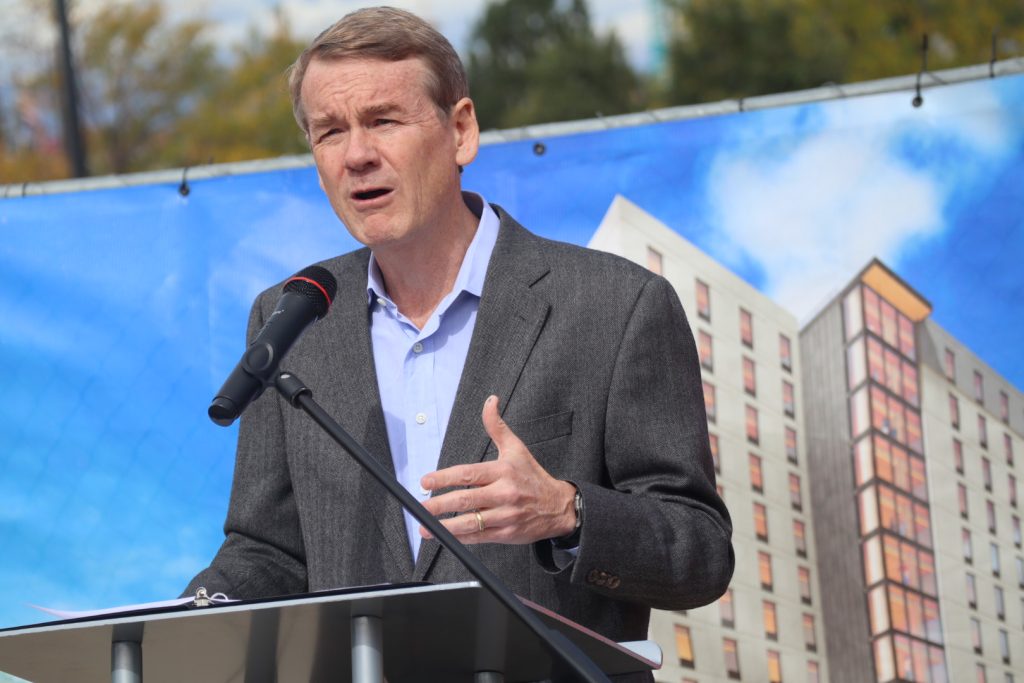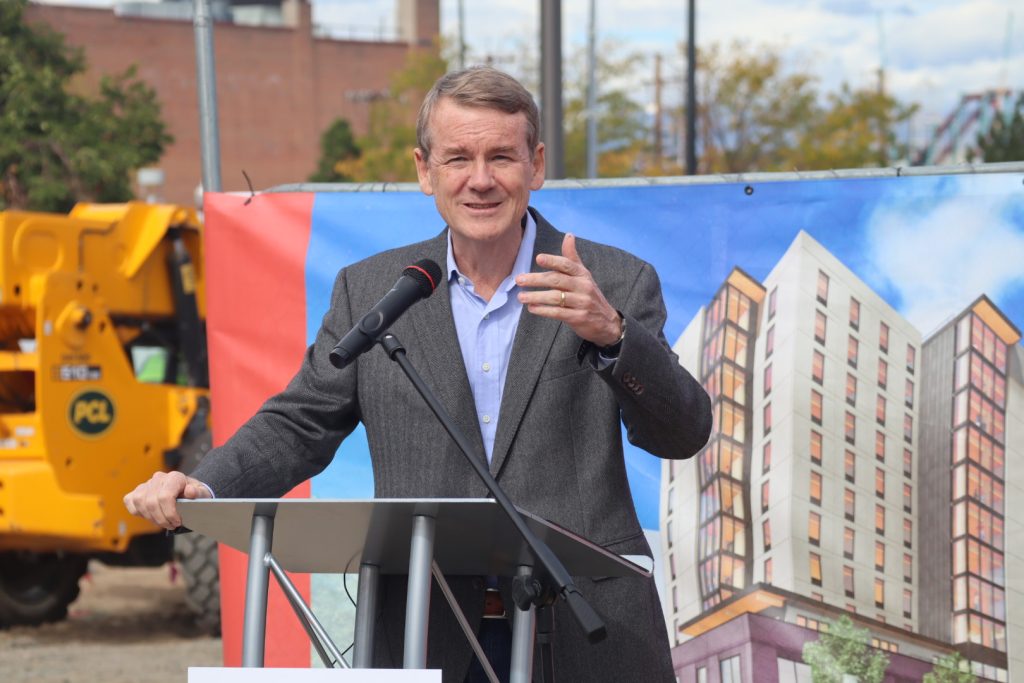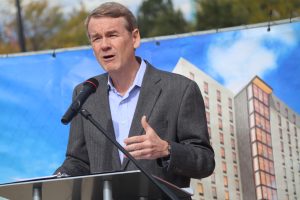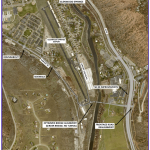Michael Bennet lays out affordable housing agenda as governor, says Colorado needs to ‘move faster’ on its goals
The third-term Democratic U.S. senator, who is running to succeed Gov. Jared Polis, also spoke on the housing needs of mountain towns versus populous Front Range cities

Robert Tann/The Post Independent
Boosting housing supply, cutting construction costs and centralizing state resources are all ways Michael Bennet says he plans to bring down the cost of housing if elected Colorado governor next year.
Bennet, a third-term Democratic U.S. senator and former superintendent of Denver Public Schools, unveiled his housing agenda to reporters on Monday during a press event in Denver, where he said his ultimate goal is to keep Coloradans’ housing costs to no more than 30% of their income.
“We are in a housing crisis that threatens families, communities and our economy, and we have to address it,” Bennet said. “The truth is, it’s getting harder and harder for all of Colorado’s workforce to afford to live here any more. We cannot allow that to become a foregone conclusion.”
Bennet announced his bid in April to succeed Gov. Jared Polis, who is term-limited. His main opponent for the Democratic primary is Colorado Attorney General Phil Weiser. On the Republican side, candidates include former U.S. Rep. Greg Lopez, state Sens. Barbara Kirkmeyer and Mark Baisley, state Rep. Scott Bottoms and Teller County Sheriff Jason Mikesell.
In all, over 30 individuals have filed as candidates with the Colorado Secretary of State’s Office. Whoever wins the Democratic primary, however, will be in a strong position to secure the governorship in November 2026. Colorado’s deep-blue electorate hasn’t elected a Republican governor since 2002. Polis won election in 2018 by more than 10 percentage points, and was re-elected in 2022 by nearly 20 percentage points.
Much like how Polis centered affordable housing as the key priority during his run for a second term, Bennet is making the issue a cornerstone of his campaign. A new report from the state demographer’s office shows that Colorado, as of 2023, needed 106,000 homes to meet its demand, and that housing prices have continued to outpace wage growth.
In recent years, Polis and the state legislature have moved to direct more than $500 million in pandemic-era relief funds toward affordable housing, implemented a roughly $300 million annual state fund for housing efforts, and passed land-use and construction defect reforms aimed at increasing the supply of new homes.
While Bennet’s housing plan largely builds on that work, he said the state needs to “move faster” on its housing goals.
Bennet says his housing plan was developed in concert with local officials, developers, nonprofit, and philanthropy organizations, and has buy-in from communities across Colorado.
“I think there’s a feeling that, if we can work collaboratively together, then we can push this housing agenda faster, and that’s what Colorado needs us to do,” Bennet said.
He wants to do that by centralizing state housing funds for developers and creating a single application to access that funding. Bennet also wants to set a goal for projects that receive state funding to break ground within one year of approval.

Other strategies include increasing the amount of state-funded housing by 30% by 2035; expanding state partnerships with banks, employers and other entities to provide mortgage and down-payment assistance; acquiring and rehabilitating existing affordable units; providing developers with more access to lower-cost financing, below-market-rate land and faster approval processes; and finding stable funding for rental assistance, legal aid and other programs aimed at reducing homelessness.
Weiser’s team declined to comment on Bennet’s housing plan or provide immediate details about Weiser’s housing platform. Wesier’s campaign website lists housing as the first of his many goals as governor and includes several of his accomplishments on the issue as attorney general, including suing corporate landlords over alleged price-fixing collusion.
Bennet said developing a comprehensive, statewide approach to housing is “essential for the future of the state of Colorado.”
“We can’t put it off one more day,” he said. “This was urgent 10 years ago, and today, it is a crisis for Colorado, and we have to address it.”
Still, Bennet acknowledged the nuances in tackling Colorado’s housing issues, saying there is no “one-size-fits-all” approach for every community.
It’s an issue that’s come to a head before at the legislature, which took two years to pass Polis’ sweeping land-use reform proposal at the center of his “more housing now” agenda.
Initially, Polis’ plan would’ve forced local governments to allow for denser housing, especially in transit corridors, in practically all parts of the state. The measure also sought to ban minimum parking requirements for most new residential development and force communities to allow for accessory dwelling units, often called ADUs.
The plan faced steep opposition, however, from representatives of mountain communities, who argued that boosting supply without strict affordability measures would do nothing to bring down housing costs in their markets and only lead to more expensive units, vacation homes and short-term rentals.
The legislature ultimately exempted rural resort areas from the bulk of Polis’ housing legislation, which lawmakers passed last year in pieces, and instead focused on populous areas along the Front Range. Officials from mountain towns said they instead want to focus on local solutions, like creating income-based housing, with the state’s help.
“I’m very sensitive to the idea that they don’t want the same efforts that we might need in Denver,” Bennet said. “I’m sensitive to that because I think the character of all these communities are different, I think the nature of the challenges are different.”
Some ideas proposed to state lawmakers that have so far failed to advance include higher property taxes on short-term rentals and allowing local communities to approve taxes on “vacant” homes. In some ski towns, as many as 1-in-3 properties are used as a short-term rental, and around half of homes can sit vacant throughout the year, according to local housing studies and U.S. Census data.
Bennet did not say whether he supports a statewide policy on short-term rentals or vacant homes, but said, “I believe everything should be on the table.”
He said the way to address the housing crisis is by “inviting solutions to this comprehensive plan, not by rejecting them. So I will not draw any lines.”

Support Local Journalism

Support Local Journalism
Readers around Glenwood Springs and Garfield County make the Post Independent’s work possible. Your financial contribution supports our efforts to deliver quality, locally relevant journalism.
Now more than ever, your support is critical to help us keep our community informed about the evolving coronavirus pandemic and the impact it is having locally. Every contribution, however large or small, will make a difference.
Each donation will be used exclusively for the development and creation of increased news coverage.










